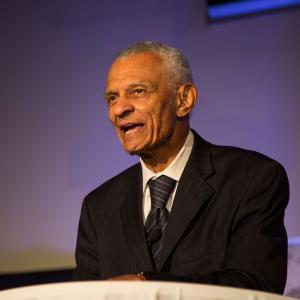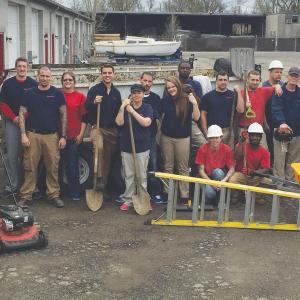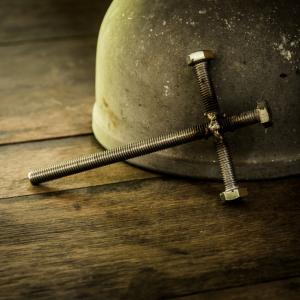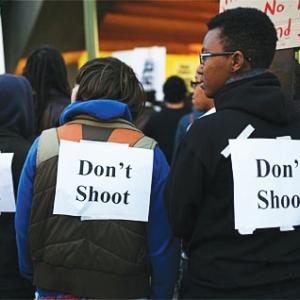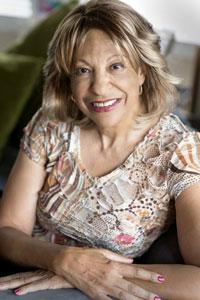
Rev. Dr. Susan K. Williams Smith is an ordained minister and the founder of Crazy Faith Ministries in Columbus, Ohio. She serves on People For the American Way Foundation’s African American Ministers In Action. She is working on an authorized biography of civil rights organizer C.T. Vivian.
Posts By This Author
C.T. Vivian Wanted Us to Remember: The Civil Rights Movement Was Deeply Spiritual
While researching C.T. Vivian’s life, I had the honor of sitting with Vivian for hours, hearing about his life and work. “This was truly a religious experience,” he said. “People need to know that.”
Can Business Be Beautiful?
THE FIRST TIME I saw John Rush was during a 2015 political forum at a local high school in Columbus, Ohio. Rush was running for city council, and though all the candidates had been invited, many didn’t bother to show up. As Rush began his presentation, he brought empty chairs up on the stage and made some quip about how the chairs were waiting for the absent candidates. The joke was not cryptic or unkind; it drew gentle laughter and applause from the audience. I didn’t know what party Rush belonged to, but I was captivated.
As a longtime pastor in Columbus, I’d seen a lot of candidates for city council. All of them had the usual rash of promises: They would create jobs; they cared about “the least of these”; they listened to the hearts of the people. Voting for them would help change the world.
But Rush seemed different. Though he was a white man with a military-style buzzcut speaking to a room full of African Americans, he didn’t seem shy or uncomfortable. He didn’t make a lot of promises. He just talked about how he knew what people were going through, and his knowledge seemed genuine, like he had “been there.” He mentioned growing up really poor, in Appalachia, and how that felt. He joked about being an evangelical who cared about more than the wedge issues of abortion and same-sex marriage. He talked about knowing how to listen to and appreciate all kinds of people. Nobody, it seemed, was an outsider to him.
Rush eventually lost his bid for election, but the more I learned about him, the more fascinated I became. He spent his early years in a trailer park surrounded by racism, joined the Marines, and later returned to the Midwest to help found a nondenominational church in Chicago. He now runs a business that helps people who were incarcerated or caught in human trafficking reintegrate into society. He was an ordinary person, leading an extraordinary life.
What People Meant For Evil …
The Rev. C.T. Vivian, who was central to the achievements of the civil rights movement of the 60s, said in an interview with me this week that the evil perpetrated at Emanuel AME Church in Charleston, S.C., was “the best thing that could have happened.”
Not the deaths of the innocent people, he says, but the evil act that was carried out in a house of worship made way for critical action that might not otherwise have happened. “It came out even better than anybody would have thought,” he said, “because we not only got the flag down, but more than that, we got rid of the great Southern symbols. If we handle it right, we have a good chance of getting a whole lot done more than we thought. Black ministers have to go to white ministers and say this is the day that we've been waiting for, the day when the public is really ready to have the war of yesterday forgotten.”
Vivian may well be right, but the incident made this writer wonder, yet again, about the whereabouts of God in the presence of oppression.
How to Use the Gift of Pentecost
The issue isn’t that God does not have power; the issue seems to be more that we do not use the power that God gave to us. While we profess to love God and God’s son Jesus, we are all too ready to dismiss what God gave us in, with, and through the life, death, burial, and resurrection of Jesus. While we say we are Christian, we bypass too often the words of Jesus and latch onto other parts of the Bible, most often the words of Paul. While Paul’s writings have their own power, they do not have the power of Jesus’ words, nor do they carry with them the promise of the Holy Spirit, which does have the power to sustain and strengthen us.
A National Shame
AFRICAN AMERICANS around the country are finding it is dangerous to call 911. Jack Lamar Roberson’s family in Waycross, Ga., discovered this the hard way when they placed an urgent call to 911 in October 2013 because his fiancée thought that he had taken an overdose of diabetes medicine.
Instead of sending EMTs, the dispatcher sent the police. Within 20 seconds of being in the house, police shot Roberson nine times, with bullets striking his back, arms, chest, and head as he held his arms up in the air. Although he was a veteran, he did not die from bullet wounds at the hands of strangers in a foreign land. Instead, white police gunned him down in his home.
Killings like this—which could be called anti-black hate crimes by police—are far too common. “Operation Ghetto Storm,” a 2012 report by the Malcolm X Grassroots Project, revealed that white police officers, security guards, or vigilantes kill an unarmed black man, woman, or child every 28 hours in the U.S. In 2012, police officers shot 57 people in Chicago—50 were black, two were white. Miami police officers killed seven black men within eight months in 2011. The Houston-based African-American News & Issues headlined an article this spring: “Open Season on Blacks in Texas: Cops Are Shooting First & Not Asking Questions.”
These police killings of black people emerge out of a culture and system of white supremacy. In such a context, police killing of black people is not a black problem. It is an American problem that shreds the curtains of democracy.
